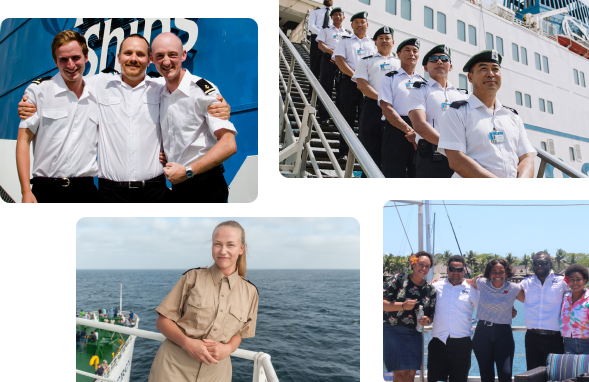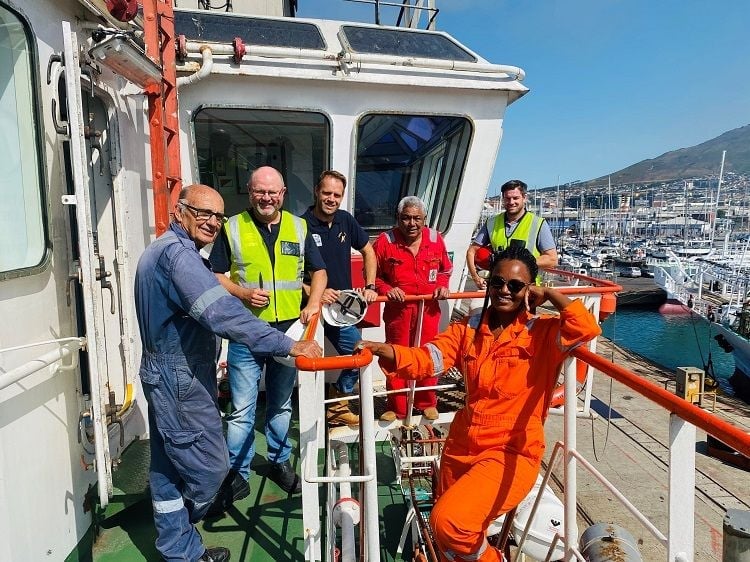How Shipowners & Crew Managers Can Deal with Language Barriers

There are numerous advantages, and some challenges too, when it comes to crew management. And for your crew who are working in seafarer jobs and living the typical seafarer's life at sea those challenges can be a very real part of their daily lives.
And as a small to medium sized shipowner or ship manager, you know very well that the very nature of the maritime industry means that crew members of all levels of experience will find themselves working alongside people who hail from different cultural backgrounds, and who speak a different language.
Breaking down language barriers when you're a Crew Manager
The tired old cliché of native English speakers being able to get by speaking English L-O-U-D-L-Y is exactly that - a tired old cliché.
Therefore it falls to seafarers of all nationalities - and the shipowners and ship managers who employ them - to do the very best they can to overcome language barriers while working in one of the many maritime jobs to choose from.
Read more: How to Handle Employees & Crew Who Don't Get On
English: the maritime industry lingua franca
But that can be easier said than done and although English is the lingua franca that shipping companies throughout the industry, and indeed global businesses, operate upon, for native English speaking seafarers who attempt to communicate in another tongue the outcome will usually only be a positive one.
Firstly, showing respect for another culture is a huge deal and whether you’re a ship owner or manager, a cadet, a rating or an officer, being empathetic to the different nationalities you have on board will help to foster a mutually respectful workplace.

It's a part of crew management and it doesn’t take a rocket scientist to realize that when all crew members feel appreciated and valued - regardless of their background, religion, language or ethnicity - they will likely be a more engaged and loyal workforce.
And that will have a big impact on your crew retention rates.
Hello, Kamusta, Привет, Hola, Здрастуйте
Respect is really the foundation of conquering communication issues and at its most basic a seafarer can show consideration by at least knowing which language their fellow crew members are speaking.
Read more: How to Communicate with Your Remote Teams & Offshore Crew
Is your small to medium sized shipping company helping to foster a culture of tolerance and diversity, both in your offices and onboard your vessels? If not, it would be well worth looking into, and also understanding how communication can contribute to your employee and crew retention rates too.
Maritime jobs can be challenging but suggesting that your seafarers learn a few key words and phrases in the languages that are likely to be encountered on board will go a long way to helping create a friendlier and more favorable working atmosphere.
These words could be as simple as ‘hello’ and ‘thank you’ in Russian or more technical and industry related in Tagalog. And of course it won't hurt you to be able to able to speak to, or at least greet, your candidates and hires in their native tongue either!
Read more: 6 Tips for Managing Overly-Emotional Crew & Employees
One thing that is important in crew management and that shipping companies should instill in senior crew is that when communicating in English with non-native speakers, using simple and direct speech will help get the message across and avoid misunderstandings.

That means not using slang or idioms and only using jargon when necessary and when it has been established that everybody knows its meaning.
After all, clear communication is crucial onboard to make sure that your crew is working alongside each other effectively and that safety standards are met without confusion.
Language training in maritime jobs
On a similar note, suggesting that your masters and chief officers, or whoever is training your crew on land, use visual methods of communication - such as charts, diagrams, drawings, and pictographs - will be helpful for all crew members, regardless of language, particularly during training sessions.
And while we’re on the subject of training for maritime jobs, shipping companies of all sizes may also want to consider introducing language classes as a crew management tactic.
These could be informal and fun or related to different topics such as navigation at sea or trigonometry in marine engineering.
Of course language classes can go both ways and will also be extremely beneficial for non-native English speakers who need to learn specialized words for their respective jobs at sea and other terms related to the maritime industry.
However for native English speakers who are on board a vessel which is mostly crewed by Ukrainians or Filipinos, learning basic communication in their fellow seamen's mother tongue will go a long way to ensuring a safer, more efficient and amicable voyage.
While it's true that there are challenges that come with any job at sea, it doesn't mean that they have to be insurmountable. And the likelihood is that the ship as a whole will benefit from having a crew that can communicate more efficiently and effectively. All this leads to making crew management for you less stressful!

Not only that but the well-being of those working on-board will increase as they are given the language skills to be more productive in their working life and more social in their downtime.
Are you a shipowner or manager looking for qualified and skilled seafarers to fill your empty maritime jobs?
Our global talent pool of candidates gives you access to qualified seamen from all over the world. Embrace the diversity of a mixed crew and what seafarers of different nationalities, personalities and skill sets can bring to the table.
Best of all, and if this sounds like something you'd be interested in, Martide has the answer to all of your needs!
Not only can we provide you with seafarers who match your requirements, but our Software as a Service will help you do everything from advertising your vacancies to tracking applicants, to delegating tasks throughout your recruitment pipeline to trusted staff members.
Are you ready to streamline YOUR recruitment and crew management systems and processes?
Let's talk. We'd love to schedule a no strings attached demo with you and show you how we can help your small to medium sized shipping company power your maritime recruitment and crew management efforts forward.

Eve Church
Eve is Martide's content writer, publishing regular posts on everything from our maritime recruitment and crew planning software to life at sea. Eve has been writing professionally for more than two decades, crafting everything from SEO-focused blog posts and website landing pages to magazine articles and corporate whitepapers.
UK

is the only site for maritime jobs



